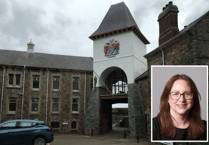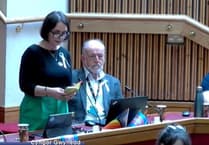THE latest community news from Harlech
Historical Society
THE extraordinary and controversial life of the composer Joseph Holbrooke, who spent nearly 30 years in Harlech, was relayed by the society’s president Dr David Craik at the March meeting.
Born in 1878 Holbrooke was the son of a music hall conductor, inheriting his father’s talent. He studied at the Royal College of Music where he met his lifelong friend, the composer, Granville Bantock. Holbrooke’s first job was as assistant to his father at Collins Music Hall, Islington. In 1896 he became a pianist in Arthur Lloyd’s touring music hall “The House of Genuine Fun”. His first composition was an arrangement of “Three Blind Mice” in 1900. Three years later he visited Harlech with the first motor cycle seen in the town.
Holbrooke took up residence in Harlech in 1906 which was to be his home for 27 years, and introduced Granville Bantock and another composer, Cyril Shott, to the town.
All three were in the pay of their patron, T E Scott-Ellis, Baron de Walden of Chirk castle. Their first home in Harlech was known as ‘Bantock’s mad house’. In 1912 they spent a wild summer in a corrugated hut in Tanygrisiau which they called ‘The Hash Pot’ where they chewed weed - ostensibly for inspiration.
It seemed to work for Holbrooke because he produced most of his compositions in Harlech, many inspired by Welsh culture and legends. They included five concertos, eight symphonies and three operas. The latter were based on the tales of the Mabinogi, the most famous (or infamous) of which was “Bronwen”, an adaptation of the story of Branwen which is set in Harlech. It had but three performances. Another composition, “The song of Gwyn ap Nudd” required 22 harps, which also reduced the possibilities for its performance.
However his piano concertos were more successful.
After the War He contributed to the annual Harlech Festival, including the concerts at Wern Fawr, home of George Davison. He wrote piano sonatas such as “Talsarnau” and “Penmachno” and his compositions did much to revive interest in Welsh music and culture. From 1933 until 1948 Holbrooke maintained a home at Hafod Wen whilst also living in London. After 1945 his career went into decline as his health failed. He became increasingly unstable, firing off vitriolic letters seeming not to care who he offended. He fell out with Henry Wood, the BBC and the musical establishment.
He despised Vaughan Williams, disliked Elgar’s compositions and strove through his work to move away from the ‘straitjacket’ of Victorian and Edwardian music.
He spent his last years in Islington where he died in 1958.
In conclusion, David Craik noted that Holbrooke’s contribution to music remains largely unappreciated. However, two of his compositions were performed at the Proms in 1930 and more recently there has been a revival of interest in his work. Dr Craik was warmly applauded by a large audience for his interesting and amusing talk.
Community Council
THE treasurer distributed copies of the council’s accounts up to the 31 December 2017 to every member so that they could see what was the financial situation.
A discussion took place regarding this matter and it was decided that the estimated spenditure of the council for the next financial year would be as follows - council insurance £2,000, clerk’s wages £1,600, clerk’s costs £1,712, tax on clerk’s wages £320, clerk’s accountant £180, donations to various organisations £5,000, donation to Old Library Committee £1,000, donation to Memorial Hall committee £1,000, precept propsal donation to Harlech & Ardudwy Leisure £18,968.80, toilets partnership with Gwynedd Council £8,000, grass cutting of the cemetery £1,800, grass cutting of the public footpaths £2,500, grass cutting of King George playing field £1,000, cemetery expenses £3,500, repair roof of Old Slaughter House £3,984, improvements to King George playing field £5,000, emptying litter bins in King George playing field £400, council’s website £1,500, inspection of playing fields £540, tennis courts rates £100, upkeep Bron y Graig Nature Trail £600, Welsh Water (allotment tap) £40, hire of meeting room £143, upkeep of public seats £750, One Voice Wales Membership £300, Internal and External Auditors £300, sunderies £1,000, Chairman’s Account £100.
After a discussion and forseeing what the council’s expenditure would be for the next financial year, and also now that the council had agreed to give a contribution for the next five years to HAL, contribute towards the partnership with Gwynedd Council to keep the toilets open and also there is a need to carry out urgent upkeep works on the Old Slaughter House and erect a wall in the public cemetery and this is without including the other costs that are needed to run the council on a monthly basis. It was decided as the Council had not raised the precept enough last year to cover the costs that occurred during the year and that the financial situation is now very fragile and to bring the situation into hand to raise the precept to £70,000.
If you’re a member of a club, society or group, send your news to [email protected]


.jpeg?width=209&height=140&crop=209:145,smart&quality=75)

.jpeg?width=209&height=140&crop=209:145,smart&quality=75)
Comments
This article has no comments yet. Be the first to leave a comment.